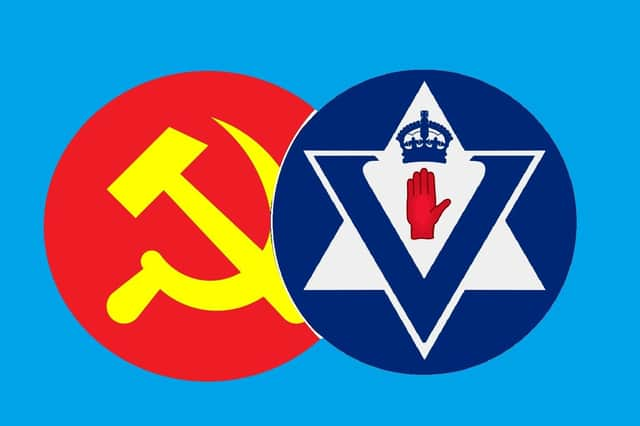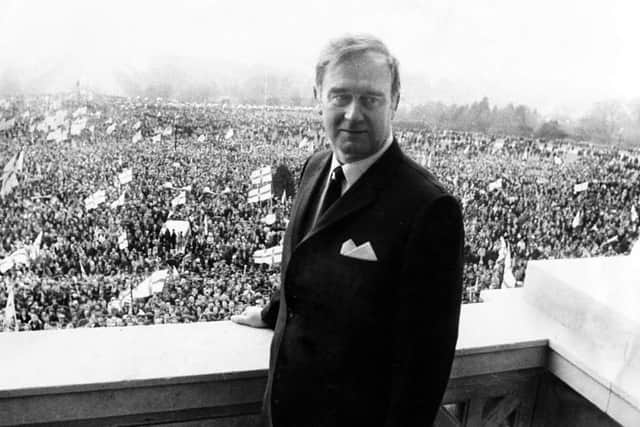The thoughts of David Trimble - supposedly a hardline traditionalist - ranged over everything from Ulster Vanguard to Marxism


If he was willing to play to the Orange and Loyalist galleries during his journey to the leadership of the Ulster Unionist Party (UUP) in 1995, he then made it clear quickly that he would not be reticent in arguing the Unionist case with Nationalists and Republicans, and in making necessary compromises for the greater good of Northern Ireland as a society and its place in the UK Union.
It has been well observed that there would have been no Good Friday Agreement in 1998 without him, and no prospect of the essentials of the Agreement enduring without his tenacious and courageous advocacy.
Advertisement
Hide AdAdvertisement
Hide AdThose who chose him as UUP leader on account of what they believed was an uncompromising brand of ‘traditional’ Unionism, neglected to reflect on his past willingness to take political risks and to go beyond a ‘dig your heels in’ political posture.


Trimble’s political apprenticeship in Bill Craig’s Vanguard movement in the 1970s is key here.
Vanguard was militant and populist, and is chiefly remembered for its leader’s menacing rallies and speeches.
Nevertheless, it was also something of a Unionist think tank attracting young, restless, and bright activists such as Trimble and Reg (later Lord) Empey.
Advertisement
Hide AdAdvertisement
Hide AdWithin its ranks were academics such as the eccentric but cerebral Kennedy Lindsay, and there was no fear of exploring radical visions of Northern Ireland’s political future, including independence as a Commonwealth Dominion.
Craig’s long-term political preference, as vouchsafed to the Scottish political journalist and thinker Neal Ascherson, was an autonomous Northern Ireland within a properly federated UK.
In 1975 Craig confounded observers by pushing for ‘voluntary coalition’ with the Nationalist Social Democratic and Labour Party (SDLP), and the restoration of devolved government in a power-sharing form.
This led to him being denounced by most of his own colleagues and other Unionists, but not by Trimble.
Advertisement
Hide AdAdvertisement
Hide AdIn fact, Trimble had been instrumental in planning for such a coalition by consulting academic experts such as the distinguished Professor of Politics,
Bernard Crick, to fashion new structural arrangements pertaining to parliamentary committees.
It is clear that constructive and innovative ideas about governance drove the young Trimble, and continued to preoccupy him as he altered career path to become a Law lecturer following the failure of Craig’s initiative.
In his recollections of Trimble at Queen’s University, Paul (Lord) Bew has commented on Trimble’s eagerness to read and digest ideas from the Marxist left of the political spectrum, notwithstanding his essential Conservatism.
Advertisement
Hide AdAdvertisement
Hide AdTrimble was riveted, for example, by the pamphlets produced in the 1970s and 80s by the British and Irish Communist Organisation (BICO) in which a ‘Two Nations’ interpretation of modern Irish history underpinned a belief in the greater progressiveness – or potential for such – of the UK from a left wing standpoint.
Trimble was always agnostic about schematic political doctrines – his political ‘bible’ was the philosopher Karl Popper’s ‘Poverty of Historicism’; but while the Marxist teleology of BICO did not convince, he was much influenced by the group’s critique of Irish Nationalism’s refusal to appreciate the ideological foundations of Unionism.
In addition, he was always keen to articulate a ‘Popperist’ scepticism regarding Irish Nationalism’s notions of destiny and the supposed inevitability of a 32 County state.
In light of this it should not have shocked so many people that Trimble engaged immediately on becoming UUP leader with those from a Nationalist and Republican tradition such as Proinsias de Rossa, the then leader of the Workers’ Party in Ireland, an outfit with its roots in the ‘Official’ IRA.
Advertisement
Hide AdAdvertisement
Hide AdTrimble also, tellingly, sounded out journalists from a Nationalist background such as Eoghan Harris and Malachi O’Doherty to gain an insight into Republican thinking, and encouraged fellow academics like Arthur Aughey to supply more modern and forward-looking Unionist arguments.
There has been no Unionist leader, before Trimble or since, who has been so knowledgeable about the history of political thought in Ireland, and has been so adept at re-orienting Unionism to meet the challenges Nationalism presented.
Trimble achieved much for Unionism in his formidable negotiation of the terms of the 1998 Agreement.
It is hardly a reflection on him that the ‘spirit’ of the agreement has been corrupted in so many ways since he was leading the consociational executive.
Advertisement
Hide AdAdvertisement
Hide AdFrom a Unionist point of view, Trimble’s restricting of the scope and reach of the North-South bodies in Strand Two (he was acutely aware in this respect of the problems in the previous Sunningdale agreement), his stress on the importance of the East-West counterweight in Strand Three, and his insistence on binding these North-South and East-West bodies to the Executive and Assembly of Strand One, was remarkable.
In the end Trimble could not bring about the fundamental culture shift in Unionism more broadly which he sought: the shift from a battle-hardened fear of the Nationalist bogey to a positive vision of a reformed Union.
Too many reverted to hard-line positions in the face of symbolic changes such as policing reforms and the initial refusal of the Provisional IRA to decommission weapons, and too many were ‘spooked’ by a media-savvy Republican movement skilled at presenting the Agreement as a step towards their goal of Irish unity.
The eclipse of the UUP, and Trimble’s political career, by the Democratic Unionist Party (DUP) by 2005 has since left Unionism struggling to re-capture the promise which he, and those outward-looking people who gathered around him in the 1990s, represented.
Advertisement
Hide AdAdvertisement
Hide AdProfessor Graham Walker of Queen’s University Belfast is author of A History of the Ulster Unionist Party: Protest, Pragmatism and Pessimism
For more opinion, click here
For some news stories you won’t read anywhere else, click here: